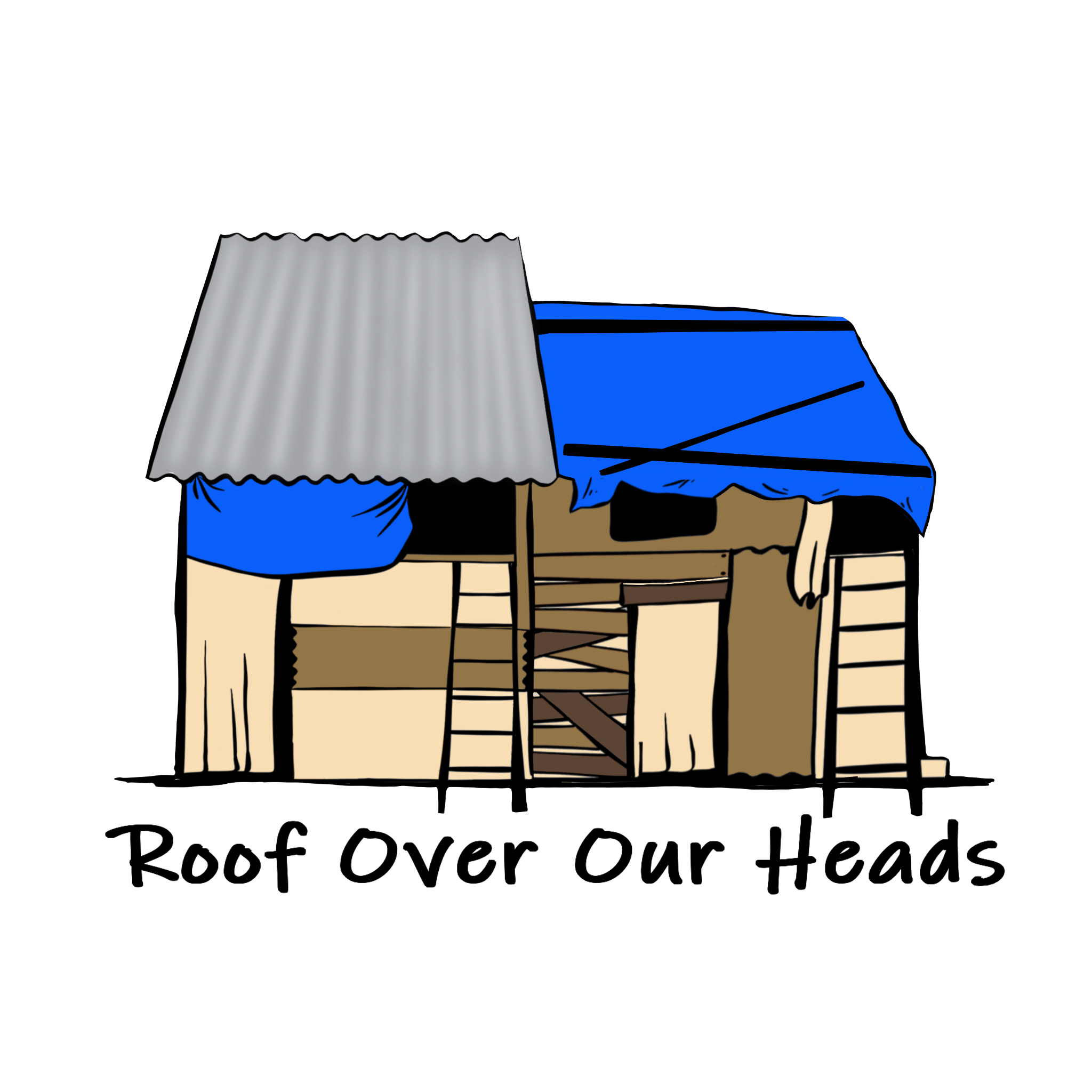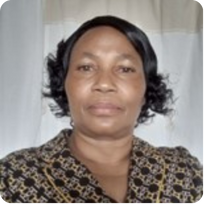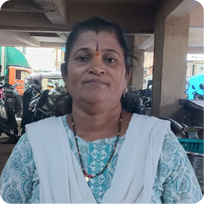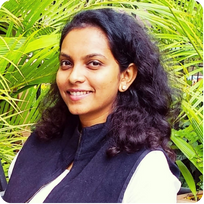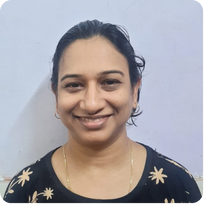Roof Over Our HeadS
ROOH CHALLENGE
A Crucible for Change
Roof Over Our Heads
ROOH CHALLENGE
A Crucible for Change
Roof Over Our HeadS
ROOH CHALLENGE
A Crucible for Change
Are you passionate about urban resilience and ready to showcase your creativity to shape the future of informal communities?
Welcome to the Roof Over Our Heads (ROOH) Challenge! The Challenge invites undergraduate, postgraduate, and PhD students pursuing studies in design, architecture, planning, engineering, social sciences, and humanities to register and participate in this challenge.
Roof Over Our heads is a global campaign that seeks to create resilient homes by empowering women’s collectives and their vulnerable communities. Our initiative focuses on equipping these groups to assess and mitigate the vulnerability of their homes to extreme weather, with the support of designers, contractors, material providers, finance experts, city officials, and mayors.
We invite young university students to take up this challenge and explore their potential role in developing innovative solutions to enhance the weather resilience of informal homes. This is a unique opportunity to address the issues faced by vulnerable neighbourhoods, particularly in the Global South, where homes are often built informally, with limited resources and despite these challenges, they design construct and finance their homes with what they know.
In Phase 1, ROOH Labs has successfully documented 17 informal settlements across nine cities in India, covering five different climate zones. We’re calling upon participants to craft an incremental upgrade or retrofitting solution for a dwelling unit in an informal settlement located in one of five cities across different climate zones. Your task is to tailor your design to meet the needs of a specific family and location, leveraging detailed climate and contextual data provided from Phase 1 documentation of the ROOH Labs. Your challenge is to select one of the five challenge components from the documentation and analysis our team has conducted and use your knowledge to create recommendations for resilient homes capable of withstanding extreme weather conditions like heat, wind, and water.
Your solution should incorporate enhanced construction techniques using locally available materials or propose alternative building materials that are affordable, accessible, adaptable, and community-approved. The aim of the design is to enhance resilience, sustainability, and liveability within the selected context.
The challenge is entirely VIRTUAL.
Eligibility
- No entrance fee.
- Open to local and international students from all countries.
- Exclusively for students from various academic backgrounds: Architecture, Design, Planning, Engineering, Social Science, Humanitarian, and Development Studies (undergraduate, postgraduate, or PhD).
- Participate individually or in groups (max 10 members)
- Inter- university and Inter- disciplinary collaboration are encouraged irrespective of your affiliations.
- Each participant may compete either as an individual or as a member of one group only throughout the challenge.
- Proof of student status is essential to be eligible
- Multiple entries are not permitted.
- Practicing professionals are not eligible to participate.
Aim of the Challenge
To transform hypothetical and theoretical ideas into tangible solutions for communities living in informal settlements in India across climatic zones, with a special focus on amplifying the voices of women within these communities and addressing their needs.
Objective of the Challenge
- Foster Multidisciplinary Collaboration – Unite students from Architecture, Engineering, Environmental Studies, and Social Sciences to create comprehensive housing solutions.
- Develop Practical Solutions – Design context-specific housing that addresses Heat, Wind, and Rain challenges in informal settlements with a focus on climate resilience and affordability.
- Bridge Theory and Practice – Turn theoretical knowledge into practical designs that benefit vulnerable urban communities and enhance climate resilience.
- Integrate Local Knowledge – Use local techniques and knowledge from the ROOH team’s research in India to ensure sustainable and effective housing interventions.
- Empower Women and Artisans – Highlight and empower the role of women, artisans, and skilled laborers in community development through targeted housing upgrades.
Outcome of the Challenge
The winning design will serve as a practical blueprint for resilient housing solutions tailored to the unique challenges of different climate zones, empowering local communities and fostering sustainable development.

WINNER 1
US $5000
Group - BuildToLast
CEPT University, India
Detail
Bhubaneshwar, Odisha
Climate: Warm & Humid
Members –
- Arha Pandya
- Leonie Singer
- Meenakshi A.
- Nidhi Chavda
- Ria Patel

WINNER 2
US $3000
Group - Team Blueprint
IDPT, SCET, Sarvajanik University, India
Detail
Gangtok, Sikkim
Climate: Cold
Members –
- Devam Shah
- Khushi Jain
- Maaz Multani
- Manav Sailor
- Mayank Khatri
- Meeti Goti
- Mohamed Khatri
- Pincy Patel
- Shaikh Ubedulllah
- Shruti Patel

WINNER 3
US $2000
Group - Jenga City
CEPT University, India
Detail
Bhubaneshwar, Odisha
Climate: Warm & Humid
Members –
- Andrea Samuel
- Batul Sethwala
- Dainty Doe
- Trisha Karthik
- Vasudha Gupta

WINNER 1
US $5000
Group - BuildToLast
CEPT University, India
Detail
Winner 1
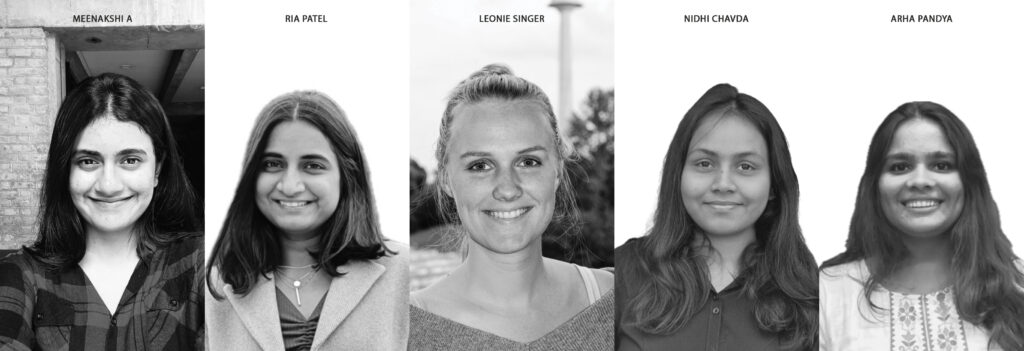
Location
Climate
Members
Bhubaneshwar, Odisha
Warm & Humid
- Arha Pandya
- Leonie Singer
- Meenakshi A.
- Nidhi Chavda
- Ria Patel
Build to Last

WINNER 2
US $3000
Group - Team Blueprint
IDPT, SCET, Sarvajanik University, India
Detail
Winner 2

Location
Climate
Members
Gangtok, Sikkim
Cold
- Devam Shah
- Khushi Jain
- Maaz Multani
- Manav Sailor
- Mayank Khatri
- Meeti Goti
- Mohamed Khatri
- Pincy Patel

WINNER 3
US $2000
Group - Jenga City
CEPT University, India
Detail
Winner 3
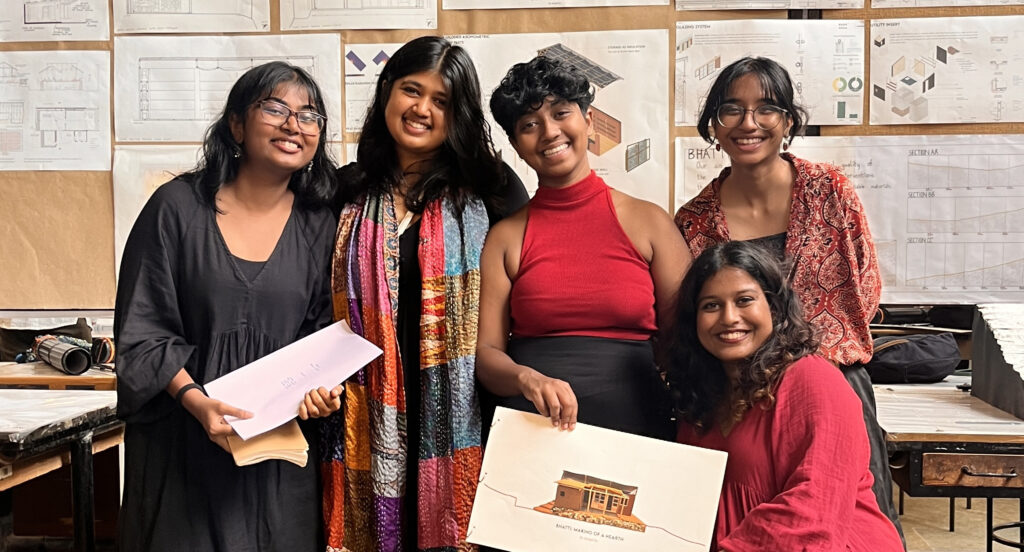
Location
Climate
Members
Gangtok, Sikkim
Cold
- Andrea Samuel
- Batul Sethwala
- Dainty Doe
- Trisha Karthik
- Vasudha Gupta
Special Mention 1
Surat, Gujarat
Climate: Hot & Dry
Group – Overhead Crews
University – Rathinam School of Architecture and Design @ TIPSGlobal Kovipalayam, India
Members –
1.Durganandhini B. 4.Showbarmika M
2.Hevin Henry M 5.Vishnu
3.Shine Isaac R
Special Mention 2
Bhubaneshwar, Odisha
Climate: Warm & Humid
Group – অধৃষ্য(Odhrishya)
University – Khulna University, Bangladesh
Members –
1.Sarkar Nafis Iqbal Niloy
2.Israt Zaman
Challenge Components
The design challenge invites participants to create sustainable and resilient housing solutions tailored for specific climate zones in India. These solutions must address the multifaceted challenges faced by households, including extreme heat, cyclonic winds, floods, fire hazards, electrocution risks, and other intrinsic and extrinsic threats to vulnerable informal dwellers. The proposed materials should not only be suitable for the designated climate zones but also demonstrate robustness against local hazards. Affordability, safety, and security of the community are paramount, ensuring that the solutions can be made accessible for all residents.
ROOH Labs are documented in 17 informal settlements across nine Indian cities in five climate zones. Participants, whether individuals or groups, have the exciting opportunity to select any one of India’s distinct climate zones (Hot Dry, Warm Humid, Cold, Temperate) and craft tailored solutions addressing the specific challenges encountered by the household in that zone.
- Hot Dry: Surat City, Gujarat
- Warm Humid: Bhubaneshwar City, Odisha
- Warm Humid: Paradeep City, Odisha
- Temperate: Bengaluru City, Karnataka
- Cold: Gangtok City, Sikkim
After registering for the challenge, participants will receive a Google Drive link sent to their registered email address. If you are part of a group, the link will be sent to the Group Captain’s email address. This link provides access to five city folders, each containing detailed information about dwelling units. Participants can review these folders and select one dwelling unit for the challenge.
Hot and Dry – Surat City
Gujrat, India
Warm and Humid – Bhubaneshwar City
Odisha, India
Warm and Humid – Paradeep City
Odisha, India
Temperate – Bengaluru City
Karnataka, India
Cold – Gangtok City
Sikkim, India
Delve into the data (Challenge Components) provided by the ROOH Team, each folder will include
- A PowerPoint presentation with background information and details about the informal settlement and dwelling units, Photos, Information on issues, challenges, coping mechanisms and details about materials currently used for construction by the resident of the dwelling unit.
- A SketchUp file with a 3D model (.skp version: 2018)
- An AutoCAD file with plans and sections (.dwg version 2019)
Focus on a specific dwelling unit and its settlement from the data provided. Utilize this information to gain insights into the context, challenges, aspirations, and material choices of the dwelling unit. Here’s how you can engage with the data:
- Analyse 3D models, plans, sections, and photos provided by the ROOH Team.
- Dive into documentation and analysis to understand the nuances of the chosen dwelling unit.
- Gain insights into historical context, challenges faced, aspirations of residents, and material preferences.
These resources will assist participants in proposing their solutions and shall be used for ROOH Challenge purposes only.
For each dwelling unit, the following components need to be addressed… Read More
Participants submitting proposed solutions for one dwelling unit among the 5 climate zones and cities should include … Read More
Participants are required to submit the final deliverable… Read More
Prizes

US $5000

US $3000

US $2000
- Selected entries will have the opportunity to collaborate with global partners in the ROOH campaign and engage with international organizations active in the climate landscape.
- Winning entries will be showcased at COP 29 in Baku during the Roof Over Our Heads (ROOH) Session, with the winners receiving official acknowledgment.
- All award-winning entries will be showcased on our website online for at least one year.
- All participants will receive a certificate of participation.
Jury

Gonzalo Muñoz
UN Climate Change High-Level Champion from the COP25 Presidency
Gonzalo Muñoz Abogabir is the UN Climate Change High-Level Champion from the COP25 Presidency, appointed by the Chilean Presidency in 2019. He co-led with Nigel Topping the Race to Zero, Race to Resilience and GFANZ campaigns. Muñoz Abogabir co-founded and led TriCiclos, one of the most recognised Latin American companies in circular economy and recycling. He co-founded Sistema B (Bcorps in Latin America), Manuia and Polkura Winery. Currently, he sits on the board of the Global Foodbanking Network, CDP Latin America, IDB Invest, Chapter Zero Chile, among others. Gonzalo has been recipient of the Chilean national awards on environment, innovation and social entrepreneurship; and was awarded the honor of CMG in Queen Elizabeth’s final honors list in 2022.

David Dodman
General Director, Institute for Housing and Urban Development Studies (IHS)
David Dodman joined IHS as General Director in September 2022, after working on sustainable urban development research in universities and research institutes for the past 20 years. As General Director, David chairs the IHS Management Team and has ultimate responsibility for the institute’s teaching, research, and impact, as well as for its organizational and operational management. He has oversight of the Institute’s strategic goals, financial sustainability, and relationships with external stakeholders. He has been a Coordinating Lead Author in the Intergovernmental Panel on Climate Change (IPCC), has played a leading role in international and collaborative research programs, and has advised a wide range of governments and international organizations. David’s research interests focus on urban climate change resilience and informality. He has published extensively in policy reports, journal articles, and edited books. Prior to IHS, David was the Director of the Human Settlements Group at the International Institute for Environment and Development (IIED)
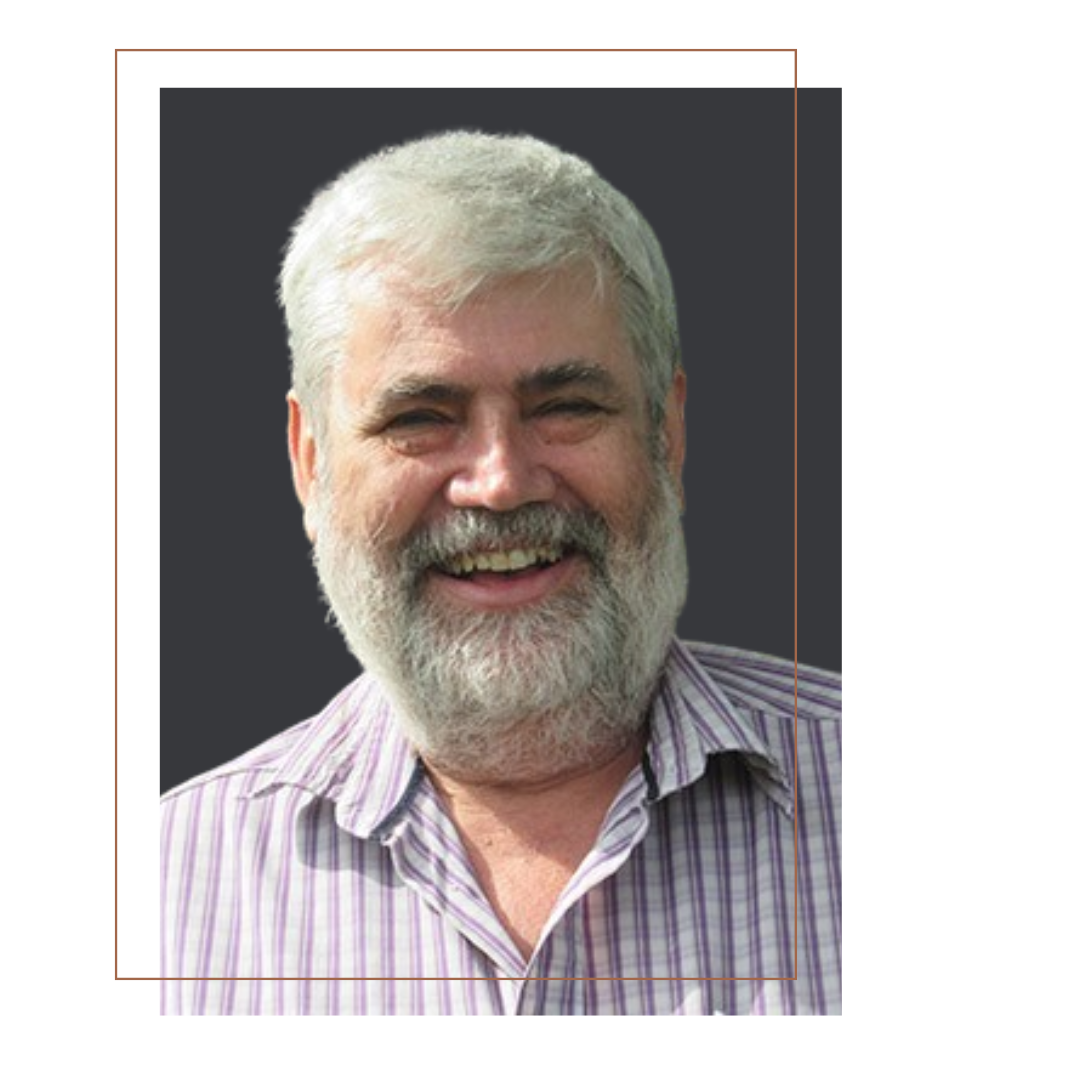
David Howlett
Head of Policy, Global Resilience Partnership and Senior Adviser to Race to Resilience and Race to Zero and Loss and Damage Lead
David is the focal point on resilience and adaptation for the Marrakech Partnership on Global Climate Action. David is seconded from the United Kingdom’s Department for International Development (DFID). He has over thirty 35 years’ experience in development in Africa, Asia and the Pacific with an academic background in chemistry, soil sciences, agriculture and environmental management and has published widely. David has worked for the last 14 years for DFID on different policy and research roles. He designed and commissioned DFID’s Building Resilience and Adaptation to Climate Extreme Disasters (BRACED) programme which has many synergies with the work of GRP.
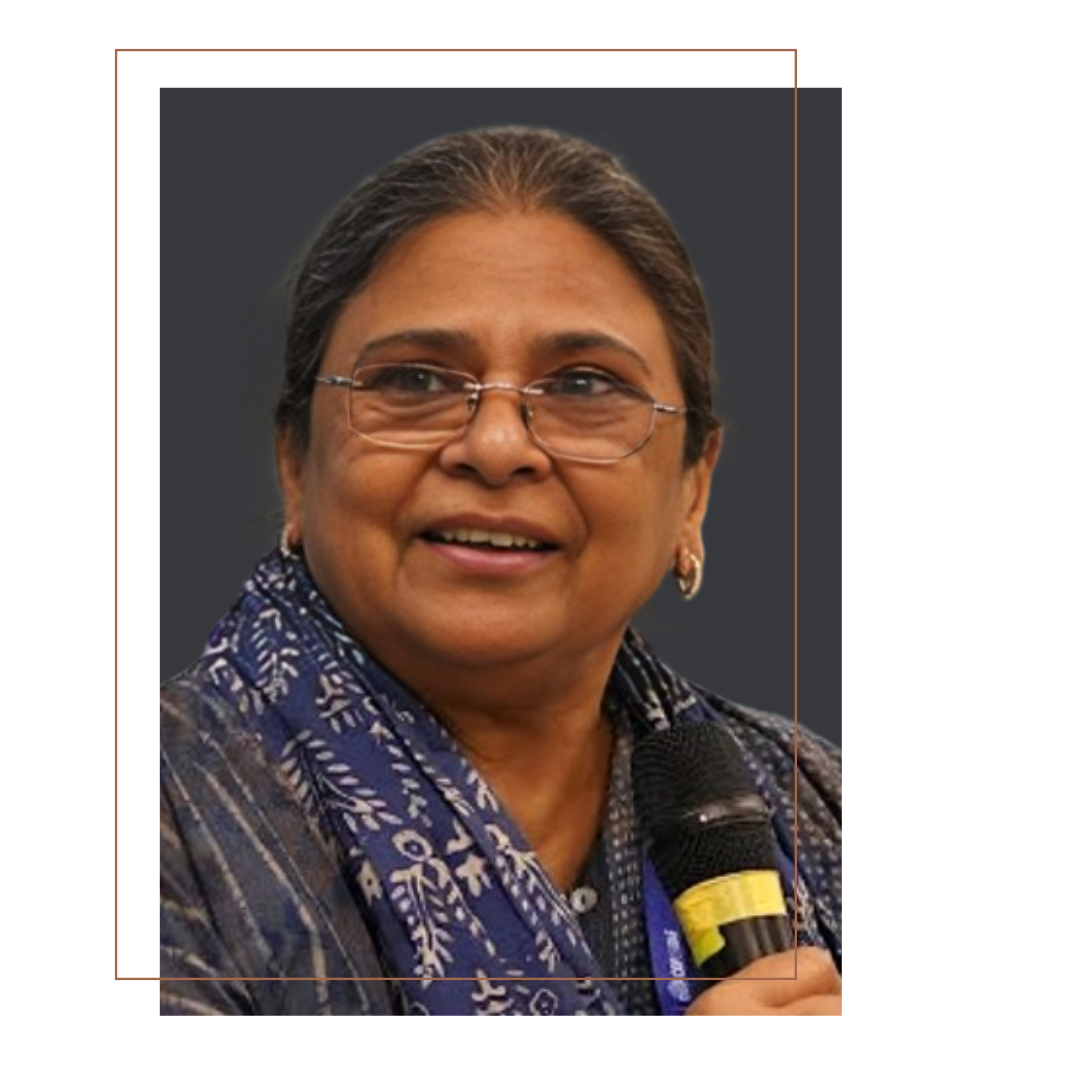
Sheela Patel
Global Ambassador for Race to Resilience and Race to Zero
Sheela Patel is the Director of Society for Promotion of Area Resource Centers (SPARC), an NGO she founded in 1984, that has been working in alliance with two Community Based Organizations of the urban poor – National Slum Dwellers Federation and Mahila Milan, active in several cities across India. She is widely recognised – nationally and internationally – for seeking urgent attention to the issues of urban poverty, housing and infrastructure onto the radar of governments, bilateral and international agencies, foundations and other organizations. Sheela is a founder amongst many of Slum Dwellers International, a transnational social movement of the urban poor in Asia, Africa and Latin America. She was a commissioner of the Commission for Adaptation to climate change between 2018-2020 and is currently a trustee of the International Institute or Environment and Development (IIED), Global Ambassador for UNFCCC’s Race to Zero and Race to Resilience, Member of the Club of Rome, and a board member of Climate-KIC. She was awarded the 2023 Lawrence C Nussdorf Urban Leadership Prize by PennIUR. Since 2022 Sheela has been spearheading the Campaign for Roof Over Our Heads (ROOH) that is now part of the UN Race to Resilience (RtR) campaign.
Gonzalo Muñoz Abogabir is the UN Climate Change High-Level Champion from the COP25 Presidency, appointed by the Chilean Presidency in 2019. He co-led with Nigel Topping the Race to Zero, Race to Resilience and GFANZ campaigns. Muñoz Abogabir co-founded and led TriCiclos, one of the most recognised Latin American companies in circular economy and recycling. He co-founded Sistema B (Bcorps in Latin America), Manuia and Polkura Winery. Currently, he sits on the board of the Global Foodbanking Network, CDP Latin America, IDB Invest, Chapter Zero Chile, among others. Gonzalo has been recipient of the Chilean national awards on environment, innovation and social entrepreneurship; and was awarded the honor of CMG in Queen Elizabeth’s final honors list in 2022.
David Dodman joined IHS as General Director in September 2022, after working on sustainable urban development research in universities and research institutes for the past 20 years. As General Director, David chairs the IHS Management Team and has ultimate responsibility for the institute’s teaching, research, and impact, as well as for its organizational and operational management. He has oversight of the Institute’s strategic goals, financial sustainability, and relationships with external stakeholders. He has been a Coordinating Lead Author in the Intergovernmental Panel on Climate Change (IPCC), has played a leading role in international and collaborative research programs, and has advised a wide range of governments and international organizations. David’s research interests focus on urban climate change resilience and informality. He has published extensively in policy reports, journal articles, and edited books. Prior to IHS, David was the Director of the Human Settlements Group at the International Institute for Environment and Development (IIED)
David Howlett is now a senior adviser on resilience in the UN Climate Change High Level Champions’ team. Prior to this co led on setting up their Race to Resilience Campaign. Before this he was Head of Policy at the Global Resilience Partnership on secondment from the UK’s Foreign and Commonwealth Development Office (FCDO). At FCDO’s predecessor, DFID, he worked on policy and research on climate change and agriculture. He has over thirty-five years’ experience in development in Africa, Asia and the Pacific with an academic background in chemistry, agricultural development and soil science at the Universities of Bradford and Leeds.
Sheela Patel is the Director of Society for Promotion of Area Resource Centers (SPARC), an NGO she founded in 1984, that has been working in alliance with two Community Based Organizations of the urban poor – National Slum Dwellers Federation and Mahila Milan, active in several cities across India. She is widely recognised – nationally and internationally – for seeking urgent attention to the issues of urban poverty, housing and infrastructure onto the radar of governments, bilateral and international agencies, foundations and other organizations. Sheela is a founder amongst many of Slum Dwellers International, a transnational social movement of the urban poor in Asia, Africa and Latin America. She was a commissioner of the Commission for Adaptation to climate change between 2018-2020 and is currently a trustee of the International Institute or Environment and Development (IIED), Global Ambassador for UNFCCC’s Race to Zero and Race to Resilience, Member of the Club of Rome, and a board member of Climate-KIC. She was awarded the 2023 Lawrence C Nussdorf Urban Leadership Prize by PennIUR. Since 2022 Sheela has been spearheading the Campaign for Roof Over Our Heads (ROOH) that is now part of the UN Race to Resilience (RtR) campaign.

Nigel Tonks
Sustainable Development Board Director, Arup and a Sr. Adviser to the UNFCCC Climate Champions Built Environment Team
Nigel is the UKIMEA Region Board Member for Sustainable Development and has over 30 years’ experience as a Consulting Engineer, working with clients and collaborators in the built environment. He is a Fellow of the Chartered Institute of Building Services Engineers. He is a senior advisor to the UNFCCC Climate Champions Built Environment Team, forging global campaigns with non-state actors for the Race to Zero and the Race to Resilience, and is an active member of the Building to COP coalition. He is the sponsor for Arup’s Whole Life Carbon commitment for Buildings and driving the program of decarbonisation of buildings for clients across its services. This includes oversight of the Arup Zero technology platform which enables WLC assessment of all Arup’s international building output to a common, whole-building standard. Working in several different countries, Nigel has experienced a wide range of regulation, green building standards and regional approaches to grappling with sustainable development. Key projects include Amorepacific Headquarters Building, Seoul (winner of the 2021 CIBSE Building Performance Award) Turner Contemporary, Margate (UK’s first BREEAM rated gallery in the UK), St Louis Art Museum (highest LEED rated public building in St Louis), and sustainable development advisory services to The Nobel Foundation.
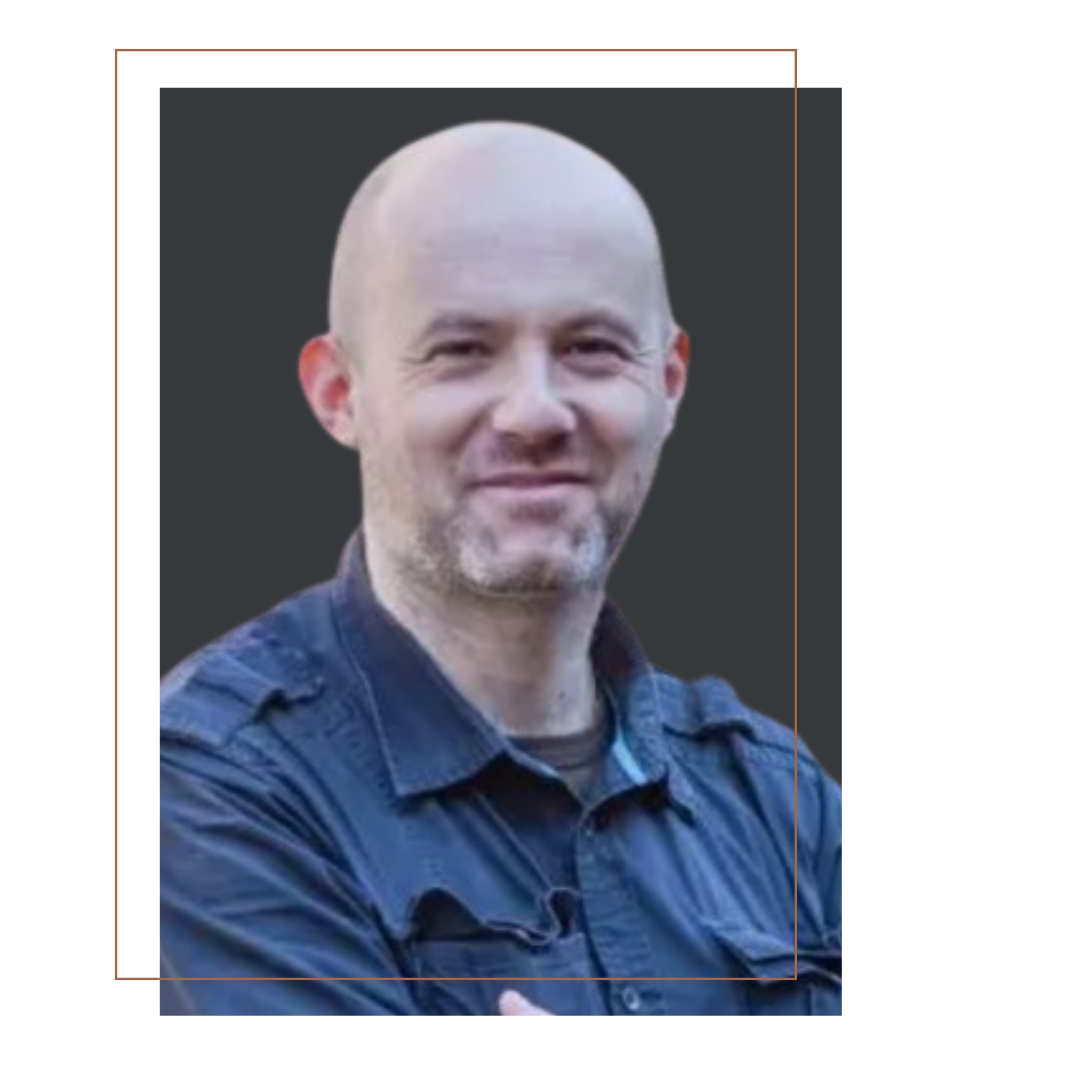
Hubert Trammer
Architect and a Member of the Roundtable of the New European Bauhaus.
Hubert is the Nominator for the European Union Prize for Contemporary Architecture Mies van der Rohe Award. Member of the juries and organizer of the architectural competitions. Member of the teams of Archigrest and Toposcape offices mentioned in the architectural competitions. He cooperated with, i.a.: Architektura-murator and A10-New European Architecture magazines, Municipalities of Lublin (PL), Puławy (PL), Strasbourg (F), Warsaw (PL), and Wrocław (PL), Society of Polish Architects SARP, National Institute of Architecture and Urban Planning (PL), Foundation of Polish Architects FTA, Polish Society of Students of Architecture OSSA, Museum of Housing Estates in Lublin, Manggha Museum of Japanese Art and Technology in Kraków, Gallery of the Contemporary Art Wozownia in Toruń, Zachęta Art National Gallery of Art in Warsaw, Warsaw Rising Museum, Museum of the Contemporary Art in Warsaw, Museum of Warsaw, BWA Gallery in Wrocław, Polish Ministry of Culture and National Heritage, German Federal Ministry of Education and Research, Volunteer Architects Network, Shigeru Ban Architects, European Commission, Europan Europe, Europan Deutschland, Ro3kvit Urban Coalition for Ukraine, Lithuanian Society of Architects, Architectuur Lokaal foundation (NL), Faculty of Civil Engineering and Architecture of Lublin University of Technology, Faculties of Architecture of Białystok and Warsaw Universities of Technology and ETH Zürich.

Lauren Anderson
Director of Programs, Perry World House, UPenn
Prior to joining Perry World House, Lauren Anderson worked within the United Nations family of organizations in the field of sustainable development for over 15 years. She was a staff member of the UN Department of Economics and Social Affairs, where she supported the work of the Commission on Sustainable Development and the Small Island Developing States Unit. More recently, Anderson served as a consultant to the UN Development Programme Multi-Partner Trust Funds on Ebola and COVID-19. In addition to her work with the United Nations, Anderson was editor of the International Institute for Sustainable Development SDG Knowledge Hub and an adjunct professor in the Africana Studies Program of Rowan University. Anderson holds a BA in ecology and evolutionary biology from Princeton University and an MA in international relations from Johns Hopkins’ School of Advanced International Studies.
Nigel is the UKIMEA Region Board Member for Sustainable Development and has over 30 years’ experience as a Consulting Engineer, working with clients and collaborators in the built environment. He is a Fellow of the Chartered Institute of Building Services Engineers. He is a senior advisor to the UNFCCC Climate Champions Built Environment Team, forging global campaigns with non-state actors for the Race to Zero and the Race to Resilience, and is an active member of the Building to COP coalition. He is the sponsor for Arup’s Whole Life Carbon commitment for Buildings and driving the program of decarbonisation of buildings for clients across its services. This includes oversight of the Arup Zero technology platform which enables WLC assessment of all Arup’s international building output to a common, whole-building standard. Working in several different countries, Nigel has experienced a wide range of regulation, green building standards and regional approaches to grappling with sustainable development. Key projects include Amorepacific Headquarters Building, Seoul (winner of the 2021 CIBSE Building Performance Award) Turner Contemporary, Margate (UK’s first BREEAM rated gallery in the UK), St Louis Art Museum (highest LEED rated public building in St Louis), and sustainable development advisory services to The Nobel Foundation.
Hubert is the Nominator for the European Union Prize for Contemporary Architecture Mies van der Rohe Award. Member of the juries and organizer of the architectural competitions. Member of the teams of Archigrest and Toposcape offices mentioned in the architectural competitions. He cooperated with, i.a.: Architektura-murator and A10-New European Architecture magazines, Municipalities of Lublin (PL), Puławy (PL), Strasbourg (F), Warsaw (PL), and Wrocław (PL), Society of Polish Architects SARP, National Institute of Architecture and Urban Planning (PL), Foundation of Polish Architects FTA, Polish Society of Students of Architecture OSSA, Museum of Housing Estates in Lublin, Manggha Museum of Japanese Art and Technology in Kraków, Gallery of the Contemporary Art Wozownia in Toruń, Zachęta Art National Gallery of Art in Warsaw, Warsaw Rising Museum, Museum of the Contemporary Art in Warsaw, Museum of Warsaw, BWA Gallery in Wrocław, Polish Ministry of Culture and National Heritage, German Federal Ministry of Education and Research, Volunteer Architects Network, Shigeru Ban Architects, European Commission, Europan Europe, Europan Deutschland, Ro3kvit Urban Coalition for Ukraine, Lithuanian Society of Architects, Architectuur Lokaal foundation (NL), Faculty of Civil Engineering and Architecture of Lublin University of Technology, Faculties of Architecture of Białystok and Warsaw Universities of Technology and ETH Zürich.
Prior to joining Perry World House, Lauren Anderson worked within the United Nations family of organizations in the field of sustainable development for over 15 years. She was a staff member of the UN Department of Economics and Social Affairs, where she supported the work of the Commission on Sustainable Development and the Small Island Developing States Unit. More recently, Anderson served as a consultant to the UN Development Programme Multi-Partner Trust Funds on Ebola and COVID-19. In addition to her work with the United Nations, Anderson was editor of the International Institute for Sustainable Development SDG Knowledge Hub and an adjunct professor in the Africana Studies Program of Rowan University. Anderson holds a BA in ecology and evolutionary biology from Princeton University and an MA in international relations from Johns Hopkins’ School of Advanced International Studies.
INTERNAL Jury
Timeline

Frequently Asked Questions (FAQs)
Have questions about the challenge? Check out the FAQs’ section for more information!
For Participation Agreement, Terms and Conditions
Organizer
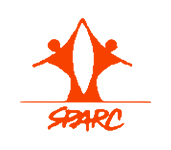
The Society for the Promotion of Area Resource Centers (SPARC) has been working on issues of urban housing and infrastructure in partnership with two community-based organizations- the National Slum Dwellers Federation and Mahila Milan. Together, we are known as the Alliance. Today, the Alliance works to produce collective solutions for affordable housing and sanitation in over 58 cities and 9 states in India. The Indian Alliance is also a founding member of Slum Dwellers International (SDI), a transnational network of the urban poor in over 30 countries.
